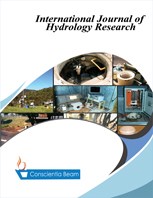Spatio-Temporal Hydro-Meteorological Variability Challenges on Floodplain Wetland Ecosystem Sustainability Downstream of Hydroelectric Dams, Niger State, Nigeria
DOI:
https://doi.org/10.18488/ijhr.v7i1.2985Abstract
Hydro-meteorological trend and recurring seasonal flood are fundamental obstacles in the country’s task towards the attainment of food security, diversification of economy, sustainability of the physical environment and socio-economic livelihood. This study utilized rainfall records (1980-2015) and hydrological record (1990-2015). A simple flood monitoring and early warning methodology hinged on an Intra-seasonal Rainfall Monitoring Index (IRMI) to identify and monitor flood condition adopted. The computed Hydro-meteorological variables (IRMI, Gauge Height, Inflow and Discharge) were summarized and classified at pentad level to determine peak flow, its variability and flood risk from low to extremely high. The result revealed spatio-temporal variability in IRMI peak values and consistency peak values across the study area. This triggered high, very high and extremely high inflow values that led to sustained moderate and high discharge in recent times; thus, leading to loss of floodplain wetland that aggravated downstream flood as evident in the study area in the years 2010, 2011, 2012, 2013 and 2014 due to steady increase and consistency in IRMI, inflow and discharge peak values. Consequently, there is need to adequately understand the hydro-climatic parameters that trigger flood risk and its impact on sustainability of wetland ecosystems to enhance the knowledge base for effective disaster risk reduction.

